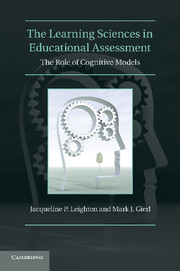Book contents
- Frontmatter
- Contents
- 1 The Learning Sciences in Educational Assessment: An Introduction
- 2 Evaluating Cognitive Models in Large-Scale Educational Assessments
- 3 Cognitive Models of Task Performance for Reading Comprehension
- 4 Cognitive Models of Task Performance for Scientific Reasoning and Discovery
- 5 Cognitive Models of Task Performance for Mathematical Reasoning
- 6 Putting It All Together: Cognitive Models to Inform the Design and Development of Large-Scale Educational Assessment
- 7 Cognitively Based Statistical Methods – Technical Illustrations
- Index
- References
4 - Cognitive Models of Task Performance for Scientific Reasoning and Discovery
Published online by Cambridge University Press: 05 June 2012
- Frontmatter
- Contents
- 1 The Learning Sciences in Educational Assessment: An Introduction
- 2 Evaluating Cognitive Models in Large-Scale Educational Assessments
- 3 Cognitive Models of Task Performance for Reading Comprehension
- 4 Cognitive Models of Task Performance for Scientific Reasoning and Discovery
- 5 Cognitive Models of Task Performance for Mathematical Reasoning
- 6 Putting It All Together: Cognitive Models to Inform the Design and Development of Large-Scale Educational Assessment
- 7 Cognitively Based Statistical Methods – Technical Illustrations
- Index
- References
Summary
Science and scientific progress are products of skilled methods of thinking about and acting on the world. The innovation, systematicness, and logic comprising scientific reasoning and discovery are therefore natural goals for governments interested in cultivating a literate, technologically savvy, and economically productive citizenry in the twenty-first century (Hanushek, 2005). As noted in Chapter 1, recent international assessments indicate variability in how well students of different nations have mastered scientific knowledge and skills. For example, U.S. examinees scored below average on two out of three content area sub-scales in the 2006 Programme for International Student Assessment (PISA), namely, explaining phenomena scientifically and using scientific evidence (see Baldi et al., 2007; see also Organization Economic Cooperation Development [OECD], 2006). This finding is not new. In 1982–1983, the National Commission on Excellence in Education, composed of a select group of university presidents, professors, and K–12 teachers, compiled a grim report on the state of science and mathematics' education in the United States: A Nation at Risk. Moreover, the National Research Council's (2007) Taking Science to School indicates that at the time A Nation at Risk (1983) was disseminated, U.S. President Ronald Reagan had already cautioned the National Academies of Sciences and Engineering of an impending decline in science and mathematics achievement, and of the erosion this decline could eventually cause the American people in their standards of living.
Information
- Type
- Chapter
- Information
- The Learning Sciences in Educational AssessmentThe Role of Cognitive Models, pp. 115 - 155Publisher: Cambridge University PressPrint publication year: 2011
